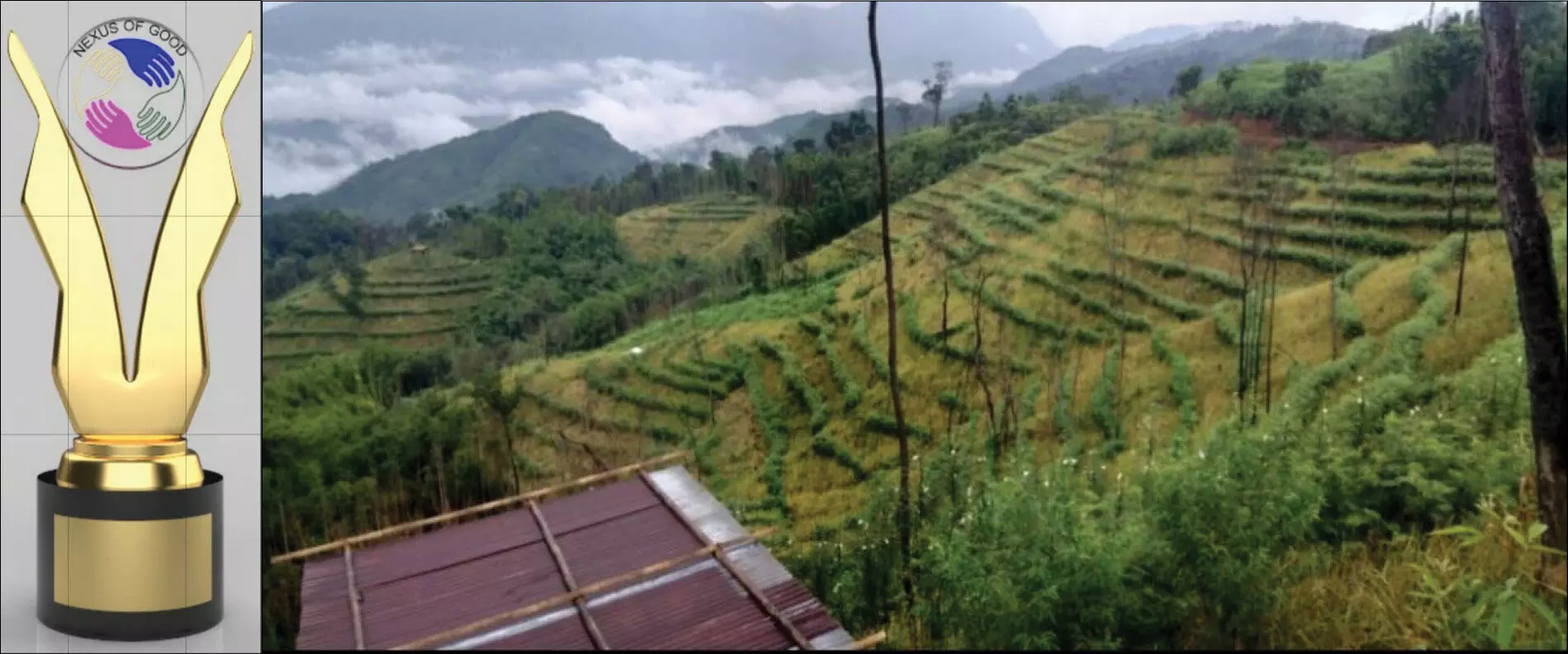Nexus of Good: Breakthrough technology
The Nexus of Good Award to David Gandhi for initiating Sloping Agriculture Land Technology in Northeastern states will boost his efforts towards ensuring sustainable livelihoods for hill farmers

This initiative demonstrates how an individual’s efforts set in motion a process of community mobilisation for addressing complex challenges affecting their livelihoods. With very little resources, the community-led initiative took root, first among a few farmers and then spread in a few years to two states. The growth continues organically.
The Northeastern states of India are well recognised as biodiversity hotspots. However, huge areas are affected by environmental degradation due to deforestation, a result of traditional jhum agriculture (slash and burn or shifting cultivation) and more recently monoculture plantations of rubber and areca nut. The steep denuded slopes are exposed to heavy rainfall which washes away topsoil. Erratic weather, excessive heavy rain and prolonged dry spells are causing crop failure, making agriculture economically and environmentally unviable for smallholder farmers. Cohesive tribal communities are increasingly breaking down as youth migrate to cities.
David Gandhi, an agriculture practitioner with over 30 years of experience of working in the rural development sector, together with his wife Usha, moved to Aben — a remote forest village in Tamenglong district of Manipur in 2016. Their purpose was to live with the tribal communities to understand their livelihoods and work to improve them. They have been serving as volunteers, living a frugal lifestyle without electricity, running water, medical facilities and the like. David works with the farmers and Usha helps with the running of the local government school.
Initially, David’s objective was to improve traditional jhum cultivation. However, after closely observing the system in its entirety, he realised that the youth have no interest in jhum as it is a system of subsistence farming which is not suited for today’s cash economy. Consequently, the youth are leaving the villages and migrating to cities for education and employment. David began searching for alternatives to jhum and found the SALT (Sloping Agriculture Land Technology) system of agriculture to be well-suited to the agro-climatic conditions and the livelihood needs of the community. However, the SALT methodology would need to be adapted to the specific context of the NE hill region.
SALT (Sloping Agriculture Land Technology) is a system of agroforestry which is proving effective in addressing these multiple yet related challenges. It conserves soil, enhances soil health and fertility, and facilitates diverse production systems to meet subsistence and market needs. SALT is proving popular among stakeholders. It involves simple technology, and uses locally available resources with minimum negative impacts on the environment. SALT requires low initial investment and gives returns over short, medium, and long term. A diverse production system distributes the risk of crop failure and market uncertainty.
The SALT adaptation effort began with a few farmer-led demonstrations in 2017, and through David’s efforts, farmers of surrounding villages were encouraged to take up SALT in 2018. The ripple effect spread to other hill districts of Manipur from 2019 onwards. David carried the message of SALT to the neighboring state of Meghalaya in 2022 where the state government expressed its interest in testing the model. Currently, over 1500 farmers across Manipur and Meghalaya are implementing SALT, supported by several agencies.
Other NE states including Nagaland and Mizoram have also expressed an interest in SALT, so David is busy building a cadre of SALT experts to take the work forward. The early SALT farms at Aben established during 2017-18 are now becoming productive and serve as sites for exposure visits and training. Over 300 persons have visited Aben for training and exposure, and a SALT Resource Centre with basic facilities for residential training has been established at Aben for this purpose.
To quote Paul Coelho, “When you want something, all the universe conspires in helping you achieve it”.
What began as David’s individual mission, soon became a joint effort. David used to regularly share briefs and photos of the work on Social Media platforms. These posts encouraged relations and friends to take an interest in his work and contribute small amounts to fund incentives such as fruit saplings for the SALT farmers. The Better India carried a write-up about the work being done by David and Usha in Manipur, which attracted more interest and offers of support. Over the years, institutions like Rongmei Naga Baptist Association, Sunbird Trust, ANAHA Trust, Mrida, Caring Friends Mumbai, and Meghalaya Basin Development Authority have come forward to support this effort and scale it up.
What David Gandhi is attempting to achieve in the remote parts of the country is truly transformational. He is addressing an issue that is so critical to the region and true of many other parts of the country. The model that he has put in place is replicable and scalable. The good news is that the model is already being replicated. It is heartening to note that though the beginning was a small one in the troubled state of Manipur, it has now found its feet in the states like Meghalaya and Nagaland.
David Gandhi richly deserved the recognition that he has got by way of Annual Nexus of Good Award, 2023. It is hoped that such a recognition will provide his effort the desired visibility so that model is adopted by other states that are afflicted with similar problems.
Views expressed are personal



